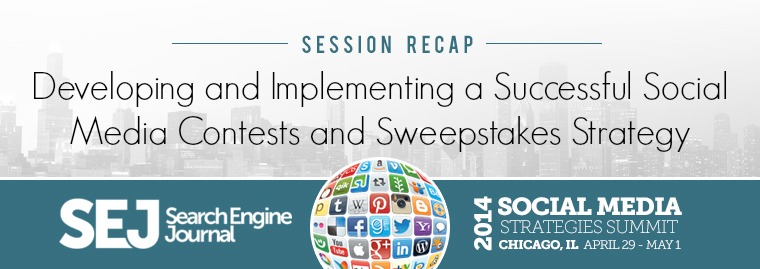
The first session I attended for the Social Media Strategies Summit in Chicago was actually a two hour workshop presented by the Fandango Legal and Marketing team on successful social media contests and sweepstakes. The team presented several case studies of successful campaigns they’ve implemented and what was needed legally and from a marketing standpoint for each. There was great insight about the legalities of social media contests, as well as how to make it exciting and engaging from a marketing standpoint. Here’s some other notes from the workshop:
Fandango’s Objectives For Contests and Sweepstakes:
- create unique engagements with industry leaders
- leverage marketplace buzz (ride the coattails)
- Synchronize with social eco-system
- support audience and fiscal strategies
- partner with bloggers and social media followers
- Ensure promotions adhere to legal best practices
Presenters Katie Drake and Cisca Brouwer of Fandango stressed the importance of a healthy tension between marketing and legal. Both are looking out for the company. After outlining objectives and the importance of the legal and marketing teams working together, they also defined success as a mixture of legal compliance, targeted promotions, and audiences & platforms. Drake and Brouwer also emphasized that companies must have a clear goal of WHY they are putting on a campaign/contest, instead of just doing a promotion to do it. They recommended creating a concrete goal (number of opt-ins, growth of social network audience, traffic increases).
They then went on to list considerations and guidelines. For social media promotion, you must consider these guidelines:
- Must be free to enter
- Must follow platform guidelines
- Must have free alternate method of entry (person doesn’t have to buy)
- Pay attention to required FTC and FCC regulations and required disclosures
- Rules have to be completed and final by the time the contest starts. You cannot change contest rules once it has started.
- Must have a “no purchase necessary” disclosure
- Must diclose free method of entry for a promotion
- Must say “enter for a CHANCE to win” not “enter to win” because people get confused and think that means they will win
- You HAVE to give the approximate retail value of prizes (trips, events, etc)
- Put all your rules/disclosures in one tweet, with the announcements of the content. Two tweets gets lost.
- MUST have No Purchase Necessary on rules and all materials (as well as announcement tweet)
User-Generated Content
For contests and sweepstakes that require users to create content (e.g. submit Instagram photo or Vine video) must have a hashtag disclosing that they are participating in a contest. Hashtags that work include: #ad #sweeps, #sponsored, #contest, and #paidad. The FTC says that a unique hashtag to the campaign/sweepstakes and neither was the hashtag #spon.
As far as reusing user-generated content within campaigns, Drake stated that they used it to promote the contests AS they are going on, to drive more engagement and entries.
Overall, the workshop had a wealth of information that helped identify key legal areas of consideration, as well as providing inspiration via case studies of successful social media contests and sweepstakes.
Featured image created by SEJ.






